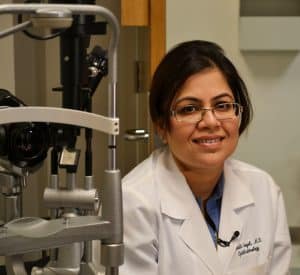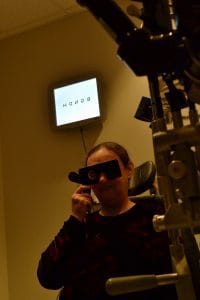Gravette Woman’s Sight Restored After Specialist Joins UAMS
| April 27, 2016 | It had been more than 30 years since Mary Green had seen anything.
She was 12 when an antibiotic caused pain in her eyes, evoking long-term issues and uncovering an underlying condition. Green was eventually diagnosed with Stevens-Johnson Syndrome (SJS), a rare disorder that affects the skin and mucous membranes.
The condition, usually caused by a reaction to a medication or infection, can cause an array of issues from a secondary skin infection to permanent skin damage or eye problems, like in Green’s case. The syndrome caused extensive scarring of her cornea and left her without vision.
“To go from 20/20 to nothing, it was traumatic,” said Green.
A corneal transplant when she was 17 briefly restored some sight. However, the transplant eventually failed and her vision dissipated again.
Slowly, Green learned to accomplish day-to-day tasks without her vision. She used a cane everywhere she went, tapping it to understand her surroundings. She learned how to shop for herself and wash her own clothes and dishes. Her dad even joked once that she was able to get clothes cleaner than him.
After she was married with children, Green continued to adapt. Admittedly, it was a challenge to change diapers, give baths and read school reports, but she learned. To read, she used a closed-circuit television and for most other tasks, “my fingers were my eyes,” she said.
“It’s amazing to learn how to do things when you go blind,” she said. “People always want to do things for you, but that’s not me.”
Last year, she was referred by David Warner, M.D., assistant professor and director of the cornea service of the Department of Ophthalmology in the College of Medicine, to cornea specialist at UAMS, Sunali Goyal, M.D.
Goyal, an assistant professor in the Department Ophthalmology, is the only ophthalmologist in Arkansas to provide surgery for Boston Keratoprosthesis, having studied the procedure during her tenure at Massachusetts Eye and Ear, a Harvard Medical School teaching hospital, where the prosthesis was developed. The treatment option is for patients with a corneal disease who are not responsive to a traditional corneal transplant.

Sunali Goyal, M.D., a cornea specialist at UAMS, studied the Boston Keratoprosthesis during her tenure at Massachusetts Eye and Ear, where the prosthesis was developed.
The device has also been used for those with severe burns or chemical injuries, as well as those, like Green, with SJS.
“This is a serious, debilitating condition that if not managed properly in the early phases, ends in blindness,” said Goyal. “Thirty years ago when Mary was diagnosed, we did not have enough knowledge to treat it; as a result, we see cases like Mary’s with blindness and scarring.”
It is no surprise that Green’s corneal transplant failed decades ago, said Goyal. A normal corneal transplant is usually rejected in patients with SJS because of a vigorous response from the immune system.
Goyal performed a procedure on Green’s right eye in March to insert the artificial cornea, made from a donor corneal graft arranged between titanium plates. The donor cornea was provided by the Arkansas Lions Eye Bank & Laboratory in the Harvey & Bernice Jones Eye Institute at UAMS, which provides, prepares and delivers eye tissue to transplanting surgeons all over the state and occasionally across the country and around the world.
Since the procedure, Green has 20/50 vision in her right eye. With time and observation, Goyal said it’s possible the same procedure could be done in Green’s left eye.
“Dr. Goyal is a miracle worker,” Green said. “I will probably treasure her for the rest of my life because it’s so special. A lot of people take their sight for granted. Don’t.”
It’s been rewarding, Green said, to rediscover so much, including flowers and just how bright sunshine is. However, the most enjoyment comes from seeing the faces of her family.
“Seeing my kids and grandkids,” Green says, “those are the ones I want to see the most.”
It’s a privilege, Goyal said, to offer this service to Arkansans. Because this procedure requires so much post-operative attention, it’s difficult for patients to receive care if they do not live near a medical center that offers the service.
“Until now, there were many patients in Arkansas who just lived with their condition because there was no appropriate venue for them to receive treatment,” she said. “For this service to be offered at the Jones Eye Institute shows great interest and passion at UAMS to improve the health of all Arkansans.”

